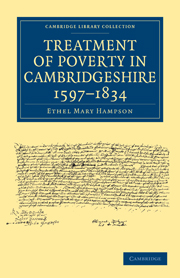Book contents
- Frontmatter
- Contents
- LIST OF ILLUSTRATIONS
- Preface
- EDITOR'S PREFACE
- CHAPTER I INTRODUCTORY: POOR RELIEF IN CAMBRIDGESHIRE BEFORE 1597
- CHAPTER II POOR RELIEF IN CAMBRIDGE DURING THE FIRST PART OF THE SEVENTEENTH CENTURY
- CHAPTER III POOR RELIEF IN WISBECH DURING THE FIRST PART OF THE SEVENTEENTH CENTURY
- CHAPTER IV POOR LAW ADMINISTRATION IN THE RURAL AREAS DURING THE FIRST PART OF THE SEVENTEENTH CENTURY
- CHAPTER V WAGE PROBLEMS. THE PROFITABLE EMPLOYMENT OF THE POOR. FIRST PHASE OF THE MOVEMENT
- CHAPTER VI HOUSING PROBLEMS AND PAUPER LABOUR IN CAMBRIDGESHIRE IN THE EARLY EIGHTEENTH CENTURY. THE ISLE OF ELY AND THE STATUTE OF 1723
- CHAPTER VII THE WORKHOUSE MOVEMENT IN THE TOWNS OF CAMBRIDGE AND ROYSTON, 1723–1785
- CHAPTER VIII THE WORKHOUSE MOVEMENT IN RURAL CAMBRIDGESHIRE, 1723–1785
- CHAPTER IX THE URBAN WORKHOUSES OF CAMBRIDGESHIRE, 1785–1834
- CHAPTER X THE RURAL WORKHOUSES OF CAMBRIDGESHIRE, 1785–1834. PARLIAMENTARY REPORTS OF 1804 AND 1834
- CHAPTER XI SETTLEMENT AND REMOVAL, 1660–1834
- CHAPTER XII PAUPER APPRENTICESHIP
- CHAPTER XIII BASTARDY
- CHAPTER XIV RELIEF OUTSIDE THE WORKHOUSE, 1660–1782
- CHAPTER XV RELIEF OUTSIDE THE WORKHOUSE, 1782–1834
- CHAPTER XVI CONSTITUTIONAL STRUCTURE AND SOCIAL POLICY
- CHAPTER XVII CONCLUSIONS
- APPENDIX
- MS. Sources and Bibliography
- Index of Names
- Index of Places
- Index of Special Subjects
- Plate section
CHAPTER XII - PAUPER APPRENTICESHIP
Published online by Cambridge University Press: 07 September 2010
- Frontmatter
- Contents
- LIST OF ILLUSTRATIONS
- Preface
- EDITOR'S PREFACE
- CHAPTER I INTRODUCTORY: POOR RELIEF IN CAMBRIDGESHIRE BEFORE 1597
- CHAPTER II POOR RELIEF IN CAMBRIDGE DURING THE FIRST PART OF THE SEVENTEENTH CENTURY
- CHAPTER III POOR RELIEF IN WISBECH DURING THE FIRST PART OF THE SEVENTEENTH CENTURY
- CHAPTER IV POOR LAW ADMINISTRATION IN THE RURAL AREAS DURING THE FIRST PART OF THE SEVENTEENTH CENTURY
- CHAPTER V WAGE PROBLEMS. THE PROFITABLE EMPLOYMENT OF THE POOR. FIRST PHASE OF THE MOVEMENT
- CHAPTER VI HOUSING PROBLEMS AND PAUPER LABOUR IN CAMBRIDGESHIRE IN THE EARLY EIGHTEENTH CENTURY. THE ISLE OF ELY AND THE STATUTE OF 1723
- CHAPTER VII THE WORKHOUSE MOVEMENT IN THE TOWNS OF CAMBRIDGE AND ROYSTON, 1723–1785
- CHAPTER VIII THE WORKHOUSE MOVEMENT IN RURAL CAMBRIDGESHIRE, 1723–1785
- CHAPTER IX THE URBAN WORKHOUSES OF CAMBRIDGESHIRE, 1785–1834
- CHAPTER X THE RURAL WORKHOUSES OF CAMBRIDGESHIRE, 1785–1834. PARLIAMENTARY REPORTS OF 1804 AND 1834
- CHAPTER XI SETTLEMENT AND REMOVAL, 1660–1834
- CHAPTER XII PAUPER APPRENTICESHIP
- CHAPTER XIII BASTARDY
- CHAPTER XIV RELIEF OUTSIDE THE WORKHOUSE, 1660–1782
- CHAPTER XV RELIEF OUTSIDE THE WORKHOUSE, 1782–1834
- CHAPTER XVI CONSTITUTIONAL STRUCTURE AND SOCIAL POLICY
- CHAPTER XVII CONCLUSIONS
- APPENDIX
- MS. Sources and Bibliography
- Index of Names
- Index of Places
- Index of Special Subjects
- Plate section
Summary
APPRENTICESHIP AND SETTLEMENT
The reigning theories of discipline, together with the growing tendency to regard him as an actual wage earner, made the lot of even the independent labourer's child no easy one from the late seventeenth century onwards, and it may be that the life of the pauper apprentice in rural parishes was but little worse than that of his non-pauper fellow.
The medieval system of apprenticeship had been adopted by Elizabethan legislators as the best mode of affording a national scheme of technical education which would prevent poverty by providing each child with the tools of a livelihood. Whilst it was no part of the Elizabethan aim to offer industrial training which should raise the labourer's child out of the ranks to which he supposedly belonged, pauperism was a sore in the body politic. Sufficient training, industrial and moral, to avoid collapse below a certain level of efficiency must therefore be secured. If such were the purpose of apprenticeship, perhaps over the country as a whole no branch of the Elizabethan Poor Law departed, during the eighteenth century, more widely from the original conception, as a result of pressure upon the rates and of the loophole which apprenticeship seemed to offer to the parish officer under the Settlement Laws.
It has been shown that the apprenticeship clauses of the Poor Law had from the outset encountered opposition, and that much stimulation by the Privy Council had been necessary before masters could be induced to accept undesirable children.
- Type
- Chapter
- Information
- Treatment of Poverty in Cambridgeshire, 1597–1834 , pp. 152 - 164Publisher: Cambridge University PressPrint publication year: 2009First published in: 1934



